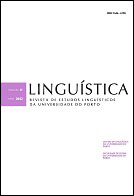On forms of address in Portuguese in Angola: the case of você (you)
Abstract
The starting point for this study is the observation that, by generalizing its use in the Angolan context, the treatment form you will acquire, as is registered in the diatopic and diastratic varieties of PE, distinct semantic values, pragmatic and discursively determined. It is because of the context (formal, informal) and the relationship (vertical, horizontal) that you registers considerable rates of occurrence in Angola, including in contexts in which, according to the standard norm, such use is discouraged. Data were obtained by applying a questionnaire with twenty questions, all simulating real communication situations. The questionnaire was distributed and filled out online by 115 participants of different educational levels, provinces of residence, age group and sex. From the data analysis, which follows an eminently qualitative approach, it was possible to identify different types of use of you: you of intimacy, you of intimacy-affection, you of respect-affection, you of superiority, you of inferiority, you of detachment; you interpolate, you derogatory. The discursive context, the type of expressive act, of praise or criticism, formal or informal, the relationship between the interlocutors, of power, solidarity, or proxemics, are determining variables for the association of one of those semantic values to you. The conclusion is the following: when a positive semantic value is associated with you, it occurs in an expressive speech act of praise and the pronominal treatment presents percentage data (very) close to the data related to the nominal treatment; when, on the contrary, it occurs in expressive acts of criticism, it reveals itself to be considerably threatening from the negative face, which is reflected in the reduction of its use, translated into (very) low percentage rates, compared to percentage rates related to nominal treatment. Therefore, the less used the you will be, the more threatening it is to the negative face of the addressee.
References
Balsalobre, S. R. G. (2015). Brasil, Moçambique e Angola: Desvendando Relações Sociolinguísticas pelo Prisma das Formas de Tratamento [Tese de Doutoramento, Universidade Estadual Paulista]. Repositório Institucional UNESP. http://hdl.handle. net/11449/127872
Balsalobre, S. R. G. (2017). Minhas Mães, Meus Pais, Minhas Tias e Meus Tios: A Teoria do Parentesco como Contribuição ao Estudo das Formas de Tratamento Nominais de Angola e de Moçambique. Estudos Linguísticos, 46(1), 252-268. https://doi.org/10.21165/el.v46i1.1542
Bazenga, A. (2017). Formas de Tratamento. https://www.researchgate.net/publication/323366226_Formas_de_tratamento
Cavalheiro, V. M. (2016). As Diferentes Regras de Uso das Formas Tu e Você e Suas Influências na Compreensão de Narrativas Literárias: PB e PE [Tese de Doutoramento]. Universidade do Porto.
Duarte, I. M. (2010). Formas de Tratamento: Item Gramatical no Ensino do Português Língua Materna. In A. M. Brito (Org.), Gramática: História, Teorias, Aplicações (pp. 133-146). Faculdade Letras da Universidade do Porto.
Gouveia, C. A. M. (2008). As Dimensões da Mudança no Uso das Formas de Tratamento em Português Europeu. In F. Oliveira, & I. M. Duarte (Eds.), O Fascínio da Linguagem– Atas do Colóquio de Homenagem a Fernanda Irene Fonseca (pp. 91-100). Centro de Linguística da Universidade do Porto.
Hammermüller, G. (1993). Die Anrede im Portugiesischen: eine soziolinguistische Untersuchung zu Anredekonventionen und Anredeformen des gegenwärtigen europäischen Portugiesisch. Nov neuer Verlag.
Leĭková, J. (2012). As Formas de Tratamento em Português Europeu [Dissertação de Mestrado]. Universidade Palacký de Olomouc. https://fliphtml5.com/pqpej/gdog/ basic/51-73
Marques, M. A. (2008). Quando A Cortesia é Agressiva. Expressão de Cortesia e Imagem do Outro. In F. Oliveira, & I. M. Duarte (Eds.), O Fascínio da Linguagem – Atas do Colóquio de Homenagem a Fernanda Irene Fonseca (pp. 277-297). Centro de Linguística da Universidade do Porto. https://ler.letras.up.pt/uploads/ficheiros/6710.pdf
Marques, M. A., & Duarte, I. M. (2019). Formas de Tratamento e Preservação da Face em Interações Verbais Online. Revista da Associação Portuguesa de Linguística, 9(5), 236-249. https://ojs.apl.pt/index.php/RAPL/article/view/15
Matoso, A. (2003). Dicionário da Gramática da Língua Portuguesa. Quarteto.
Nascimento, M. F. B. do (2020). Formas de Tratamento. In E. B. P. Raposo, M. F. B. do Nascimento, M. A. C. da Mota, L. Segura, A. Mendes, & A. Andrade (Orgs.), Gramática do Português (Vol. 3, pp. 2701-2730). Fundação Calouste Gulbenkian.
Nascimento, M. F. B., Duarte, E., & Mendes, A. (2018). Sobre Formas de Tratamento no Português Europeu e Brasileiro. Diadorim, 20 (Especial), 245-262. https://revistas.ufrj. br/index.php/diadorim/article/view/23276
Nauege, J. M. (2021). As Formas de Tratamento no Português de Angola: Contributo Semântico-Pragmático. In A. A. Timbane, D. P. Sassuco, & M. Undolo (Orgs.), O Português de/em Angola: Peculiaridades Linguísticas e a Diversidade no Ensino (pp. 124-141). Opção Editora.
Silva, A. K. da (2020). Formas de Tratamento no Português de Angola. Estudo Sociolinguístico [Tese de Doutoramento, Universidade de Évora]. Repositório da Universidade de Évora. http://hdl.handle.net/10174/28355
Teixeira, E. P. (2008). O Pronome Você no Português de Luanda. In M. C. Lima-Hernandes, M. J. Marçalo, G. Micheletti, & V. L. Rossi (Orgs.), A língua portuguesa no mundo (pp. 1-16). FFLCH-USP. https://dlcv.fflch.usp.br/sites/dlcv.fflch.usp.br/files/03_9.pdf
Downloads
Published
Issue
Section
License
Copyright (c) 2022 Linguística: Revista de Estudos Linguísticos da Universidade do Porto

This work is licensed under a Creative Commons Attribution-NonCommercial 4.0 International License.



